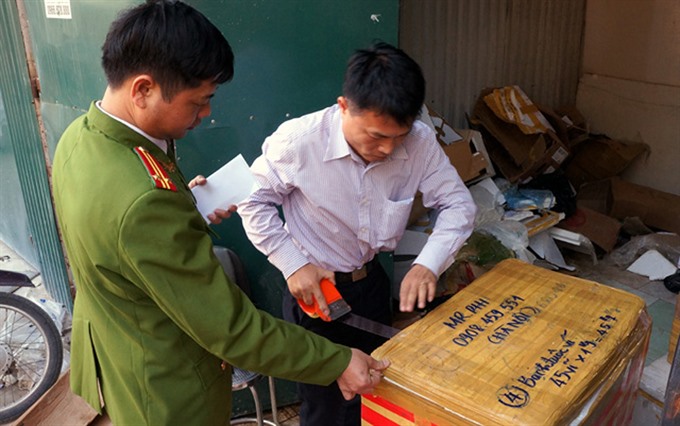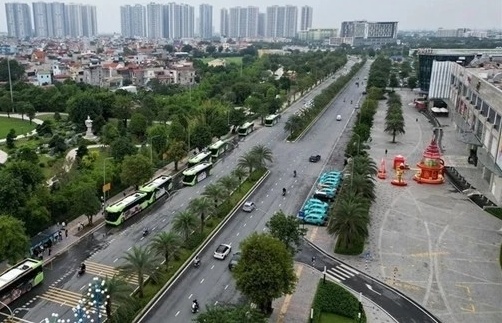Hà Nội to tighten control of frozen food storage
 |
| Hà Nội police check frozen food containers at a store on Trung Kính Street. - Photo dantri.com.vn |
Phí Thanh Hải, deputy head of Agro-Forestry-Fisheries Quality Assurance Division under Hà Nội’s Department of Agriculture and Rural Development, said the biggest difficulty was to track the origin of frozen food and produce because an imported batch of goods weighing 10 to 20 tonnes is divided into packages of one to two tonnes and sold to traders at wholesale markets for consumption. The majority of traders fail to provide the food’s certificate of origin, making food safety check difficult.
The division checked stocks of Thảo Nguyên Xanh (Green Grassland) Food Joint Stock Company, which provides frozen poultry and cattle meat. The inspectors found that the meat products were stored mixed together without name brands. The company was also unable to show documents tracking the origin of buffalo meat and pig cartilage, Hải confirmed the information with the Việt Nam News.
The city’s Department of Agriculture and Rural Development checked vegetable stocks of Hà Nội Safe Vegetables Joint Stock Company and found 80 litres of vinegar and 10kg of thin-top mushroom of unclear origin, he said.
According to company director Lê Văn Tú the dry food produced by the company is sold to wholesale markets where traders are only concerned about prices. The food is produced by farmers, but due to small-scale household agriculture, farmers have not paid attention to brand building and product stamps.
A study conducted by the Hà Nội Mới newspaper showed the majority of frozen food stocks in the city do not meet technical standards, nor have private rooms to store each category of goods.
Deputy director of Hà Nội’s Department of Agriculture and Rural Development, Nguyễn Huy Đăng, urged relevant sectors and local authorities to tighten control over preservation conditions of frozen food stocks.
Violating food companies will be asked to put stamps on the products and clarify the production location. Dry and frozen food must be stocked separately, he said. The company must also check the quality of infrastructure and equipment used to preserve food and produce.
After being reminded, the companies must invest in rectifying the problems or be subjected to penalties, Đăng said.
He said that at the same time, authorised agencies would raise traders’ awareness of selling food of clear origin and call on consumers to buy products with clear production and expiry dates.
Lawmakers seek solutions
Food safety management is a headache not only for Hà Nội authorities, but also a prolonged pressing issue for the whole country, which “not only affects local lives but also has impacts on negotiations and signing of commercial contracts and exports,” National Assembly Chairwoman Nguyễn Thị Kim Ngân said.
According to the Ministry of Industry and Trade, there are nearly 30,000 small-scale slaughter houses nationwide, most of which do not have business licences and hygienic conditions.
Among 54,700 inspected farming households using pesticides, more than 9,000 were found violating regulations.
According to the health minister Nguyễn Thị Kim Tiến, "some localities even do not allocate funds for food inspection. Many lack human resources and money”.
Addressing the National Assembly (NA) Standing Committee deputies last week, Tiến proposed that the NA allocate funds to solve the problems.
Other deputies argued that Criminal Code has specific regulations charging food safety violators with one to 15 years in prison, depending on levels of violations.
However, law enforcement has not been effective.
Deputy Minister of Public Security, Senior Lieutenant General Lê Quý Vương, said that over the past five years, among more than 13,000 food safety violations, 8,000 cases were handled. But only more than 90 cases were prosecuted, including one involving alcohol production resulting in the death of four people. Data shows the difficulty in providing evidence to charge food violators.
Another obstacle was assessing food and consumer health. For example, a person might consume poisonous food but the effects would not be immediately evident, making assessment of the source difficult, he said.
What the stars mean:
★ Poor ★ ★ Promising ★★★ Good ★★★★ Very good ★★★★★ Exceptional
Latest News
More News
- Vietnam's eco-school models, initiatives honoured (December 27, 2024 | 17:10)
- Vietnam turns to waste-to-energy as landfills reach capacity (December 27, 2024 | 17:06)
- Starbucks Vietnam and Gaia to foster a greener environment (December 27, 2024 | 10:00)
- Quality of domestic labour must increase for high-tech era (December 26, 2024 | 11:05)
- Website launched to raise public awareness about obesity (December 26, 2024 | 10:00)
- Health ministry seeks feedback in preparation for 2025 e-cigarette ban (December 25, 2024 | 17:40)
- HCM City's Metro Line 1 transports 279,000 passengers in first three days (December 25, 2024 | 17:32)
- PM urges investigation into deadly café arson case in Hanoi (December 19, 2024 | 15:57)
- Criminal proceedings start on Hanoi café fire that kills 11 (December 19, 2024 | 15:53)
- Hanoi plans to build nearly 600km of urban railway by 2045 (December 13, 2024 | 11:31)















 Mobile Version
Mobile Version